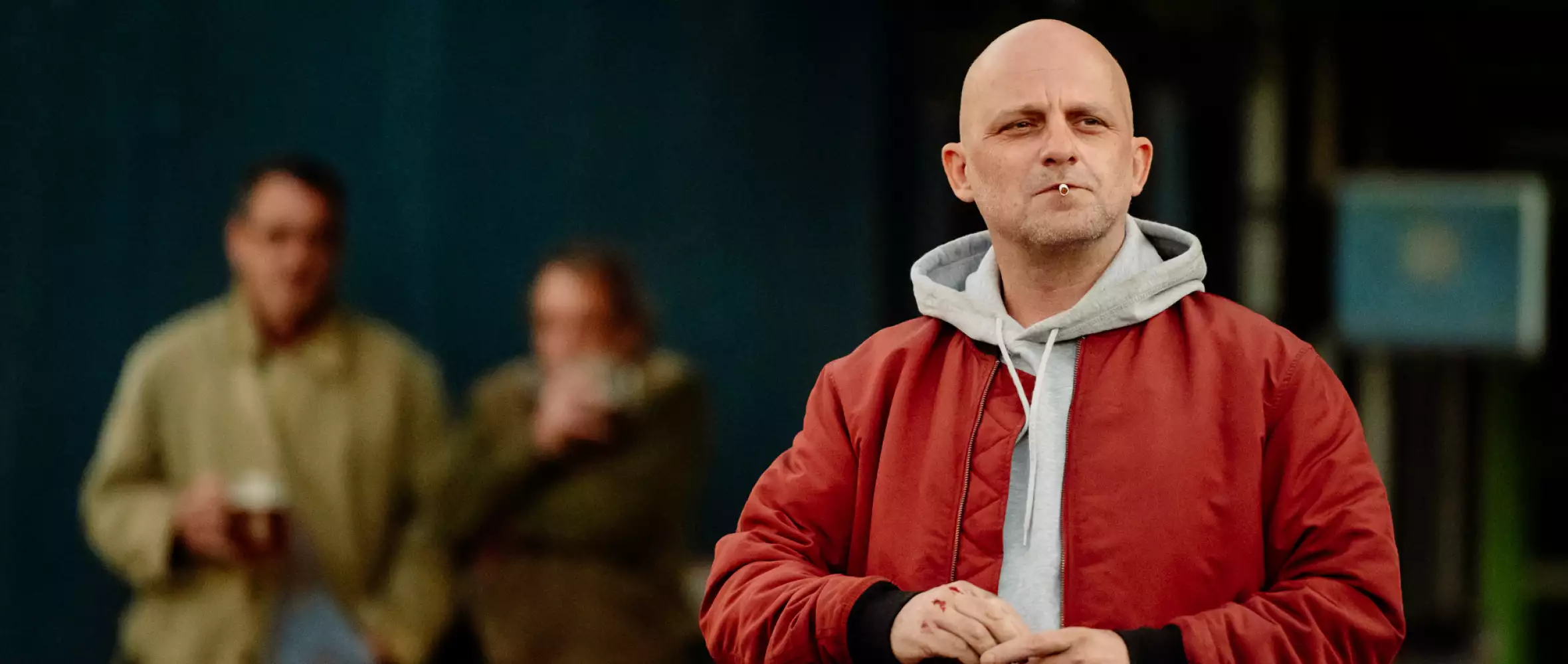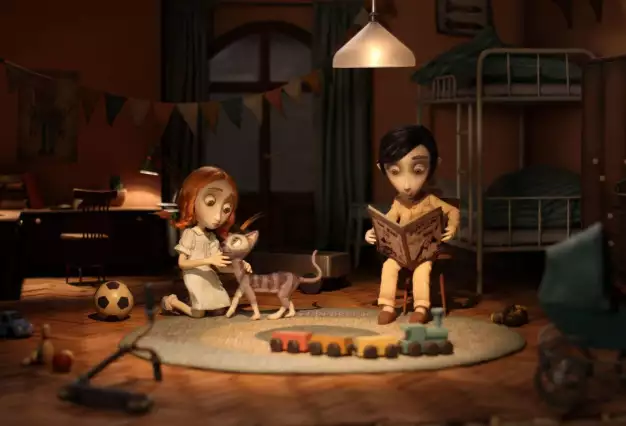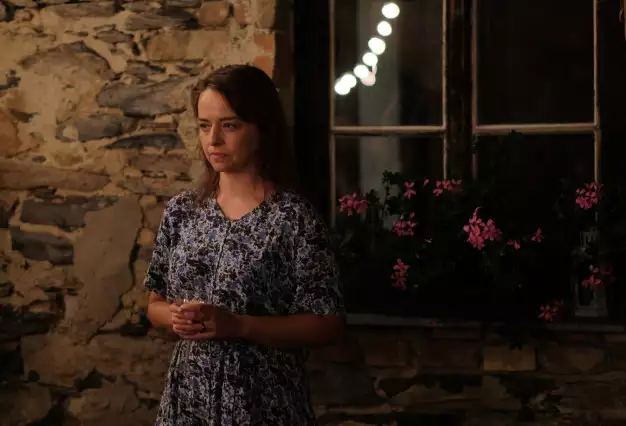
02 May 2019
National Street
A Bitter Yet Hilarious Portrait of Post-1989 Frustration
National Street
A Bitter Yet Hilarious Portrait of Post-1989 Frustration

National Street, the latest project from director Štěpán Altrichter (Schmitke), is based on the novel of the same name by Jaroslav Rudiš. Like J. D. Vance’s Hillbilly Elegy and Édouard Louis’s The End of Eddy, Rudiš’s book maps the mindscape of the underclass.
Article by Martin Kudláč for Czech Film Magazine / Spring 2019
“Hey, go wash your hands. They’re dirty.” “That’s from shoving them up the asses of guys like you,” comes the testosterone-fueled retort. Two worlds are about to collide in an ordinary Czech pub: upper-class white collars facing off against the social ladder’s lower rungs. A barmaid steps in to deflate the situation, averting violence, and once the upper-class invaders disappear, the working-class barflies celebrate to the cheerful chant “Vandam is a national hero!”
The cocky comeback in this scene is delivered with gusto — actor Hynek Čermak clearly enjoys his latest personification. Due to his menacing physique, he’s usually cast as a bad boy, but between takes he’s the complete opposite of his typical on-screen persona. In his latest role as Vandam — the character gets his nickname from his admiration for the Muscles from Brussels, who wields violence as a pedagogical tool—Čermak subverts the macho stereotype, turning it into pure comic gold. He makes people laugh with him, not at him—the mark of a true artist, and a crucial distinction given the film’s exploration of Czech society 30 years after the Velvet Revolution, viewed through a working-class lens.
A housing estate on the fringes of the capital, in southeast Prague, serves as the main location for the shooting of National Street. The district was chosen because it is home to many people like Vandam, who feel betrayed by how the country has evolved, politically and economically, since the “Velvet Revolution” of 1989. Both in the novel and the film, Vandam’s character espouses a rather controversial worldview in response to the changes around him. He is also compulsively violent, enough to lead some to say his conservatism might be just a euphemism for right-wing extremism.
“Vandam is not a neo-Nazi,” Rudiš insists. In addition to writing the novel National Street, he also cowrote the script and has become a household name in contemporary Czech literature. “He’s way too smart and individualistic to be a neo-Nazi.”
National Street has been translated more times than any other of Rudiš’s books, and its translation into film gives the story even more traction in the current political climate. In terms of its relationship to other current works, the novel can be compared to U.S. author J. D. Vance’s Hillbilly Elegy or French author Edouard Louis’s The End of Eddy, which also map the mindscape of the underclass, though critics here have dubbed Rudiš’s work a Czech Fight Club.
Rising talent in the director’s chair
Rudiš cowrote the script with Štěpan Altrichter, a FAMU and HFF Postdam-Babelsberg alumnus who helms the project as director. Altrichter’s adaptation of National Street follows his graduation film, the German-Czech coproduction titled Schmitke, which was introduced at the Busan Film Festival in 2015 and doubled as his feature debut. It was promising enough to earn him the Czech Film and Television Academy’s Discovery of the Year Award. Schmitke was a peculiar blend of crime mystery, absurd comedy, and low-key surrealism, set in the moody atmosphere of the foggy Ore Mountains. Grappling with identity crisis, alienation, and uprootedness, it featured the same set of motifs we see so prominently in National Street, though set against a different backdrop.
Altrichter was immersed in preproduction work on his ambitious (“and,” he says, “much more experimental”) project Runner when Pavel Strnad of Negativ approached him about adapting Rudiš’s novel for the screen. Oddly enough, Runner follows a protagonist in Berlin after the election of an extremist political party, but “it is not a dystopian sci-fi,” Altrichter insists.
Schmitke proved to be adequate credentials for the emerging director to be entrusted with the €1.4 million project. The Prague-based outfit Negativ — go-to producers for the grande dame of Czech documentary, Helena Třeštikova, as well as internationally acclaimed director Bohdan Slama — had already produced a previous adaptation of Rudiš’s work for the screen: Alois Nebel, named Best Animation Feature by the European Film Academy in 2012. Adapted from a series of graphic novels, written by Rudiš and illustrated by artist Jaromir 99, the black-andwhite rotoscopic animated feature was unveiled at the 68th edition of the Venice International Film Festival.
“The story revolves around a certain type of frustration, plus it’s also about the search for an identity,” says Rudiš of National Street. “Vandam reflects a world transformed. He’s definitely not one of the winners of the Velvet Revolution.” Transitioning the story to the big screen required tremendous skill to preserve the ambivalent nature of its main character, a charismatic narrator who revels in antisocial behavior. This ambivalence permeates the entire film, an irreverent and testosterone-fueled comedy that remains at its core a realistic social drama.
Social drama veiled as irreverent comedy
If Schmitke was Altrichter’s take on Lynchian atmospherics, National Street, Strnad says, hews closer to Danny Boyle’s Trainspotting in its aesthetics, framing, and storytelling technique. Under the comic coating lies a bleak story, but “if a film is too serious it ceases to be engaging,” Altrichter says. This is why Trainspotting, which also revolved around white working-class outcasts, served as a reference point for the film. The director says the Coen Brothers were also an inspiration, albeit more abstract, in his attempt to leverage Čermak’s charisma and entertaining qualities alongside Rudiš’s witty writing and strong messaging. Romanian cinematographer Cristian Pirjol returned to Alrichter’s film crew again, after shooting his debut. “He loves actors and great stories and can create a technical quality that otherwise is hard to build,” Altrichter says in his praise.
Production responsibilities from the German side are being handled by 42film, who previously coproduced the award-winning Family Film by another rising Czech talent, Olmo Omerzu. Financial support for the project came from the Czech Film Fund, Mitteldeutsche Medienforderung, Creative Europe MEDIA, and Eurimages. Strnad says he expects to have the final cut ready by March, with the film completed by May 2019, once they retire to the editing room after wrapping the principal photography at the end of November. National Street will hit local cinemas as soon as September 2019.
Talking to the producer, the director, and the author about the story, words and phrases like white trash, xenophobia, racist, poverty, and debt trap came up repeatedly. Yet, they insisted, National Street won’t be a depression-fest. And despite comedy being the driving force of the film, it doesn’t ridicule or mock the social group the narrator comes from. “We’re trying to understand the main character, his reasons and the way he thinks, what propels his behavior,” Strnad underlines.
Adds Altrichter, “Jaroslav perfectly captured the typical present-day hero: an angry, white old man.” Rudiš himself agrees, saying the waters for this story, as well as the way it’s told, have been tested already through several translations of the novel, including into German and French. Though he admits events like the ones in Chemnitz in August 2018—a fight broke out, resulting in the death of a Cuban-German man and serious injuries to two other people, with two Kurdish immigrants (one Iraqi, one Syrian) named as suspects—may contribute to the story’s allure, he strongly disassociates the book and its protagonist from any ideology, saying it isn’t about right-wing extremism.
In fact, one of National Street’s defining traits is its refusal to traffic in cliches or stereotypes, and we see this in its ambivalent protagonist, its ambiguous form of dramatic comedy, even in its casting. The pub owner and barmaid Lucka (played by Kateřina Janečkova), who cools down Vandam after the white-collar businessman comes to the pub collect a debt, is a strong character, offering an antidote to the machismo of Vandam. But she isn’t a stereotypical love interest either. “We have a great sex scene,” Altrichter says mischievously, hinting that it will be anything but corny.
The filmmakers’ strong respect for the audience, despite the difficult subject matter, suggests it may turn out to be a classic. National Street has much in common with The Inheritance or Fuckoffguysgoodday, a movie Czechs revere, by trailblazing director Věra Chytilova, who perfectly captured the post-1989 mood of transition to democracy and capitalism as a boisterous folk comedy. It seemed an odd decision at the time, but it played a huge part in the film’s cult status. To the degree National Street succeeds as the spiritual successor to Chytilova’s memorable work, encapsulating the socioeconomic shift three decades later, Vandam may turn out to be the country’s next national hero, following in the footsteps of Bohumil Stejskal, the lead of The Inheritance.




